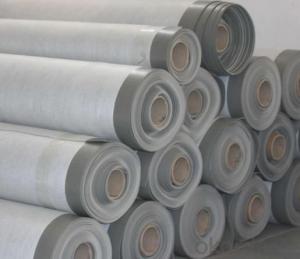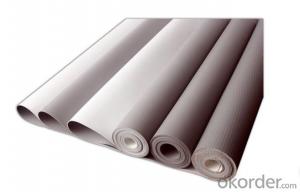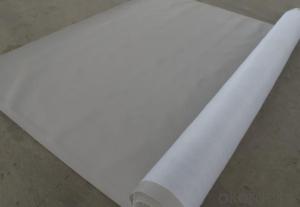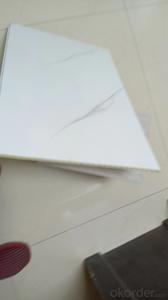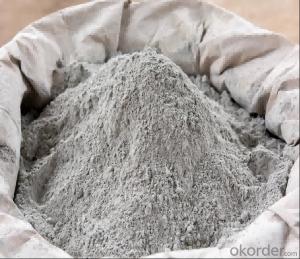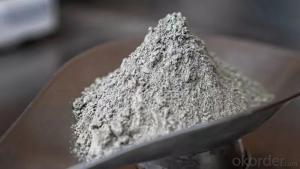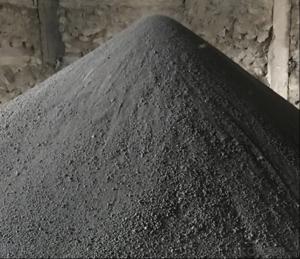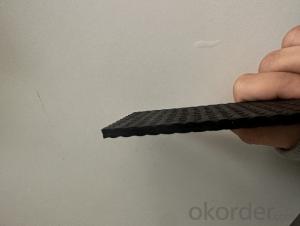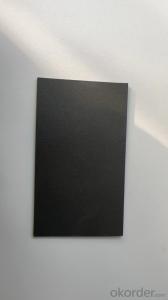PVC Root Puncture Resistant Waterproof Membrane with Fabric
- Loading Port:
- China main port
- Payment Terms:
- TT OR LC
- Min Order Qty:
- 5000 m²
- Supply Capability:
- 100000 m²/month
OKorder Service Pledge
OKorder Financial Service
You Might Also Like
PVC Waterproofing Membrane:
PVC waterproofing membrane is an excellent high-quality polymer waterproof sheet, made of PVC
resin by adding plasticizer, anti-UV agent, anti aging agent, and stabilizer and other processing
aids through extrusion and molding.
As the highlyrecommended product by the Ministry of Construction, it is featured by high tensile strength,
great elongation, good stability, small shrinkage, low-temperature performances, good resistance to
weathering and root penetration, and long service life.
Specification of PVC Waterproofing Membrane:
Item | Specification |
Length | 20m |
Width | 1.05m, 2.05m,2.1m |
Thickness | 0.8mm,1.0mm;1.2mm;1.5mm;2.0mm |
Type of PVC Waterproofing Membrane:
Type H is the principal material used on exposed roof applications, in vacuum or mechanically attached
systems. These roofing systems are suitable for new build and refurbishment applications, flat and
pitched roofs. It is reliable, and convenient for construction.
Type L is manufactured from pliable PVC with a reinforcement of non-woven polyester. The PVC contains stabilizers, which make the product resistant to
high and low temperatures, UV-resistant and makes it flame retardant.
Type P is H with a laminated polyester fleece (or glass fiber fleece) on its interlayer and
can be installed directly on old roofing underlay. We recommend that all roofs have
an inclination of minimum 1:40 to provide positive drainage.
Use scope of PVC Waterproofing Membrane:
1. The waterproofing of the Industrial or civil construction's roof, including the planting roof, flat roof, sloping roof.
2. Waterproofing of the underground building: Including reservoirs, dams, canals, and all parts of the basement water seepage.
3. Tunnel, granary, civil air defense projects, garbage landfills, and other man-made lake.
FAQ of PVC Waterproofing Membrane
a.Can we get some samples before place order?
Answer: We can send the free samples to you by freight collect.
b.How many years can your PVC membrane guarantee?
Answer: We will guarantee the quality for 5 years at least.
c.Which countries you ever export the product?
Answer: We export the PVC membrane to South Africa, Middle east and even European countries.
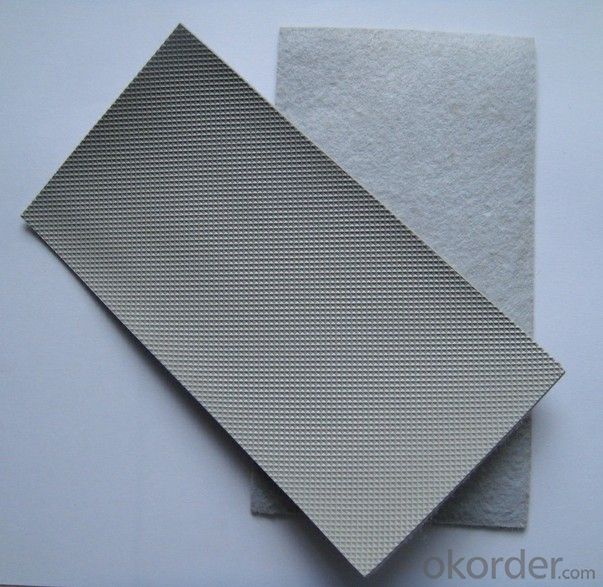
- Q:Can a waterproofing membrane be used on gypsum block surfaces?
- Yes, a waterproofing membrane can be used on gypsum block surfaces. Gypsum blocks are porous and can be prone to moisture infiltration, so applying a waterproofing membrane can help prevent water damage and moisture-related issues.
- Q:Can waterproofing membranes be used for planter boxes?
- Yes, waterproofing membranes can be used for planter boxes. Waterproofing membranes provide a protective barrier against moisture, preventing any water leakage that could damage the planter box or surrounding areas. This helps to preserve the longevity and integrity of the planter box, making it suitable for long-term use in outdoor environments.
- Q:Can a waterproofing membrane be used in chemical or hazardous environments?
- Yes, a waterproofing membrane can be used in chemical or hazardous environments. Waterproofing membranes are designed to provide a barrier against water, moisture, and other liquids, which can also include chemicals and hazardous substances. These membranes are typically made of materials that are resistant to chemicals, such as polyurethane, PVC, or modified bitumen, to ensure they can withstand exposure to various chemicals without being damaged or compromised. However, it is important to select a waterproofing membrane specifically designed for chemical or hazardous environments to ensure it meets the necessary requirements and standards for such applications. Additionally, proper installation and maintenance are crucial to ensure the effectiveness and longevity of the waterproofing membrane in these environments.
- Q:Can a waterproofing membrane be applied to existing structures or is it only suitable for new construction?
- A waterproofing membrane can be applied to both existing structures and new construction. It is a versatile solution that can be retrofitted to protect older buildings from water damage or incorporated into the construction process of new structures to prevent future water infiltration.
- Q:Can a waterproofing membrane be used in industrial facilities or warehouses?
- Yes, a waterproofing membrane can be used in industrial facilities or warehouses. It provides an effective barrier against water penetration, protecting the infrastructure and contents from potential water damage.
- Q:Can a waterproofing membrane be used for marinas and boat docks?
- Yes, a waterproofing membrane can be used for marinas and boat docks. Waterproofing membranes are designed to create a barrier against water penetration, making them an ideal solution to protect structures such as marinas and boat docks from water damage and corrosion. These membranes provide a durable and long-lasting waterproofing solution that can withstand the harsh marine environment.
- Q:Can a waterproofing membrane be used on tile surfaces?
- Yes, a waterproofing membrane can be used on tile surfaces. A waterproofing membrane is a thin layer of material that is designed to prevent water or moisture from penetrating through to the underlying surface. It is commonly used in areas where water exposure is high, such as bathrooms, showers, or outdoor areas. When applied properly, a waterproofing membrane can create a barrier that protects the tile surface from water damage, preventing issues such as mold, mildew, or tile deterioration. It is important to ensure that the waterproofing membrane is compatible with the type of tile being used and that it is installed correctly to ensure maximum effectiveness.
- Q:How does a waterproofing membrane prevent water penetration?
- A waterproofing membrane prevents water penetration by creating a physical barrier between the water source and the surface it is applied to. This membrane is usually made of materials that are impermeable to water, such as synthetic polymers or bitumen. When applied correctly, the membrane adheres tightly to the surface, forming a continuous and seamless layer that prevents water from seeping through. Additionally, waterproofing membranes are designed to withstand environmental conditions and resist the damaging effects of water pressure, temperature changes, and UV radiation. They are typically flexible and can accommodate structural movements without compromising their integrity. This flexibility ensures that the membrane remains intact and prevents any gaps or cracks that water could penetrate. Furthermore, waterproofing membranes often contain additives or technologies that enhance their water resistance properties. These could include chemical compounds that repel water, such as hydrophobic additives, or self-sealing capabilities that allow the membrane to repair itself if it becomes punctured or damaged. In summary, a waterproofing membrane prevents water penetration by creating a durable, impermeable, and continuous barrier that resists water pressure, environmental factors, and structural movements. It ensures that the surface underneath remains dry and protected from potential water damage.
- Q:Can a waterproofing membrane be used for solar panel installations?
- Indeed, the utilization of a waterproofing membrane in solar panel installations is not only possible but highly recommended. It is common practice to incorporate a waterproofing membrane into the installation process in order to safeguard the roof or other surfaces beneath the solar panels from water-related harm. The primary function of a waterproofing membrane is to serve as a barrier, preventing water infiltration into the underlying structure. This, in turn, ensures the integrity and security of the solar panel installation, which is of utmost significance considering their typical placement on rooftops, where they are exposed to various weather conditions. By incorporating a waterproofing membrane, the longevity of the solar panels is prolonged, and any potential issues arising from water are effectively mitigated, thus preserving their optimal performance.
- Q:Are waterproofing membranes resistant to water vapor transmission?
- Yes, waterproofing membranes are designed to be resistant to water vapor transmission. They are specifically engineered to prevent the penetration of water vapor through the membrane, ensuring effective waterproofing and moisture control.
1. Manufacturer Overview |
|
|---|---|
| Location | |
| Year Established | |
| Annual Output Value | |
| Main Markets | |
| Company Certifications | |
2. Manufacturer Certificates |
|
|---|---|
| a) Certification Name | |
| Range | |
| Reference | |
| Validity Period | |
3. Manufacturer Capability |
|
|---|---|
| a)Trade Capacity | |
| Nearest Port | |
| Export Percentage | |
| No.of Employees in Trade Department | |
| Language Spoken: | |
| b)Factory Information | |
| Factory Size: | |
| No. of Production Lines | |
| Contract Manufacturing | |
| Product Price Range | |
Send your message to us
PVC Root Puncture Resistant Waterproof Membrane with Fabric
- Loading Port:
- China main port
- Payment Terms:
- TT OR LC
- Min Order Qty:
- 5000 m²
- Supply Capability:
- 100000 m²/month
OKorder Service Pledge
OKorder Financial Service
Similar products
New products
Hot products
Related keywords
